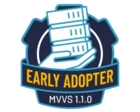Using a BASIC program, I need to read filenames and file dates from an AIX directory and compare them with names and dates held in UniVerse records. If the files are present among the UniVerse records then they need to be moved out of the directory and more files added from another directory. Any advice or code snippets much appreciated.
Question
Reading file names and date/time from an AIX directory and comparing with UniVerse records.
Sign up
Already have an account? Login
Welcome to the Rocket Forum!
Please log in or register:
Employee Login | Registration Member Login | RegistrationEnter your E-mail address. We'll send you an e-mail with instructions to reset your password.





